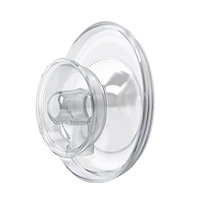Is there an “ideal” bedtime for your baby?
This depends. Newborns can spend up to 18 hours out of every 24 sleeping, but this typically comes in short stints throughout the day and night, with your baby waking to feed every few hours.
Accompanied by the fact they haven’t yet developed their circadian rhythm (or internal “body clock”), this means there’s really no such thing as an “ideal” bedtime for a newborn — their sleep patterns are irregular, their wake windows are frequent, and they’ll often sleep as much during the day as they do at nighttime.
As they get older and their body clocks evolve, however, it’s possible to start easing them into a more consistent nighttime routine. This doesn’t mean you’ll magically be able to settle them down at the same time each night — their ever-changing sleep and developmental needs will ensure it’s never that simple — but you may at least begin to be able to find a bedtime schedule that works for you and your baby.
In truth, there isn’t a catch-all “ideal” bedtime for babies, as this can vary depending on their age, sleep needs, and individual snoozing patterns. Generally, an early bedtime of around 6.30-8.30pm is considered appropriate, but the most important thing is to follow your baby’s sleep cues and find the best fit based on their usual wake-up time and nap schedule.
Is 6pm too early for a baby’s bedtime?
If you want to avoid a very early wake-up call then yes, 6pm is probably a little too early to put your baby to bed — since it’s likely they’ll be ready to “start the day” around 4-5am. We’d tend not to recommend putting your baby down until at least 6.30pm, as it stands to reason that the earlier they go to bed, the earlier they’ll wake the next morning.
Of course, if you’re fine with your baby waking up early, an earlier bedtime of 6.30-7pm may work well. But if they naturally tend to sleep in a little later or you’d prefer them to have a longer lie-in each morning, a later bedtime such as 7.30-8.30pm might be better. It’s ultimately about finding what works for you and your little one.
What if my baby falls asleep before bedtime?
If your baby falls asleep before their set bedtime, it’s generally okay to let them snooze. Their sleep needs evolve, and they’ll usually tell you when they’re ready for sleep through signs like yawning and eye-rubbing, which signal their body’s natural “sleep drive” kicking in. Forcing them to stay awake can lead to overtiredness, which can actually make it harder for them to settle down later.
If they’re regularly falling asleep earlier than expected, consider adjusting their daytime nap schedule. Their wake windows are likely to be around 2 to 3 hours (although this can vary from baby to baby), so try to time their last nap before bedtime to ensure they’re awake for long enough — but not too long — and less likely to fall asleep early come nighttime.
What if my baby goes to bed too late?
Putting a baby to bed too late can often make them overtired, which paradoxically makes it harder for them to fall — and stay — asleep. When babies become overtired, their bodies release stress hormones like cortisol, which can cause them to wake more frequently during the night and wake up earlier in the morning (not great news for parents).
If your baby is consistently going to bed too late, consider gradually putting them down a little earlier (say 10-15 minutes each night) until you reach a more reasonable bedtime. This slow transition will help them adjust to an earlier bedtime, while maintaining a calm, consistent pre-sleep routine will signal to your baby that it’s time for bed.
The (almost) perfect baby bedtime routine
Now, as we’ve established, there’s really no such thing as the ideal bedtime for a baby — the best time to put them down will depend on their own sleep needs and natural sleep patterns. It’s important to stress that the following is merely a guide rather than an exact science, and is subject to many variables.
Newborn (0-3 months)
As we’ve pointed out already, the terms “newborn” and “consistent bedtime” rarely go together. This is mostly because circadian rhythms don’t begin to develop until around six weeks of age (and won’t be fully established for at least three months), meaning their internal body clocks can’t tell the difference between day and night.
Your newborn might be ready for bed sometime between 8-11pm, but there’s no need to fixate on bedtime since their sleep patterns are usually quite erratic — “putting your baby to bed” at nighttime is really no different than putting them down for a nap during the day, since they’ll typically sleep for no more than 2-4 hours at a time, day or night.
What’s most important at this stage is picking up on their sleep cues: rather than trying in vain to set a scheduled bedtime each night, pay attention to telltale signs of sleepiness that indicate your little one is ready to be put down. Newborn sleep cues can include:
Yawning, the universal shorthand for tiredness
Becoming increasingly fussy or whimpering
Rubbing their eyes or face
Pulling on their ears of hair
Becoming less active or engaged in their surroundings
3-6 months
While babies’ circadian rhythms start developing from around six weeks, they usually become more firmly established between three and six months. This means they start to develop a natural sleep-wake cycle, and will gradually begin sleeping more during the night because their bodies understand the difference between daytime and nighttime.
While it’s normal at this stage for your baby to still be napping 3-4 times a day (check out our month-by-month guide to nap schedules to understand more about their typical daytime sleep patterns), this evolution of their body clock means it’s also possible — though not necessarily straightforward — to start establishing a more consistent bedtime routine.
As a (very) general rule, an early bedtime of around 6.30-8.30pm can help them settle into a natural circadian rhythm while ensuring they’re getting plenty of nighttime shuteye. Of course, this also gives you time to relax and unwind before your own bedtime — though keep in mind that they may wake at least 1-3 times during the night.
It’s still important to look for your baby’s sleep cues at this stage, too (and plenty of ups and downs are to be expected), but you can help them settle into a more regular bedtime schedule by creating a consistent, sleep-associated nightly cycle — for example, by focusing on the following:
Creating a calming pre-sleep routine. Activities like a warm bath, a gentle massage, or a lullaby can help your baby feel calm and ready for sleep.
Reducing stimulation. Minimise active play or loud noises before bedtime, which will help them transition from wakefulness to sleep.
Dimming the lights. Turn the lights down in their room (or switch from a main light to a bedside one) to signal to your baby that it’s time for bed.
Encouraging self-settling. Place your baby in the crib while they’re drowsy but still awake, helping them learn how to fall asleep independently.
Maintaining a consistent sleep environment. Make sure your baby’s sleep space is quiet, dark, and at a comfortable temperature. White noise can also be helpful for soothing.
6-12 months
By 6 months, your baby’s internal clock will be well established, meaning their bodies are well-versed in the difference between day and night and they’ll likely be ready for a more consistent nighttime routine.
It’s also normal at this stage for them to need fewer daytime naps (you may find that 2-3 are more than enough) and therefore sleep for longer stretches at night — for the luckiest parents, this is where the idea of their baby “sleeping through the night” may even evolve from fantasy to reality.
Because of this, you may find it easier to establish a set bedtime from around six months onwards. 6.30-8.30pm is still a good window to aim for, but your routine should reflect what works best for your baby – and for you.
Of course, milestones such as teething can temporarily impact their normal sleep schedule (usually for up to 7 days) but even so it’s important to try to keep to as consistent a routine as possible while accepting there may be ups and downs.
1-2 years
By the time they reach a year old, your baby should be down to just a couple of naps a day, and may even transition to a single nap from around 15 months. As a result, their nighttime routine will likely be far more consistent, and (sleep regressions notwithstanding) they should regularly be sleeping through the night.
This also means their bedtime should be more set in stone, and because they’re less dependent on daytime naps you can usually start to push their bedtime back slightly — 7pm to 8.30pm might be reasonable from a year onwards, but again this depends on their normal nap windows, wake-up times, and your own schedule.
If they’re resistant to bedtime (which is possible, particularly during periods of sleep regression), this is where a calming and consistent pre-sleep routine is essential. Make sure their sleep environment is conducive to a peaceful slumber, and try to maintain a regular wind-down sequence in the hour or so before bedtime.
2+ years
As your toddler gets older, they’ll naturally require less sleep overall. They’ll still need more shuteye than the average adult, but you may decide to gradually transition them to a later bedtime (8pm or later, for instance), particularly as they’re likely to take just one nap during the day (or possibly none at all) and may sleep in for longer in the morning.
If they’re still napping at least once daily but you’re keen to wean them off naps altogether, you might consider (at least temporarily) bringing their bedtime forward slightly, allowing them to sleep longer at night so they feel less tired and more alert throughout the day. Again, don’t be afraid to experiment with what works for them and for you.
A (rough) bedtime guide by age
It’s important to point out that the guidance below is very general. Each baby has their own sleep needs and develops at their own pace — there’s not necessarily a “right” bedtime for your baby, and flexibility and adaptability are often key.
Age | Average sleep required (over a 24-hour period) | Average nighttime sleep | “Ideal” bedtime | Bedtime tips |
0-3 months | 14-18 hours | 8-12 hours (plus naps) | No fixed time | Don’t fixate on baby’s bedtime; look for their sleep cues instead. |
3-6 months | 12-16 hours | 8-10 hours (plus naps) | 6.30-8.30pm | Start to establish a consistent bedtime routine, but continue to watch for sleep cues. |
6-12 months | 12-14 hours | 8-10 hours (plus naps) | 6.30-8.30pm | Focus on maintaining consistency, but be aware that sleep disruptions can occur. |
1-2 years | 11-14 hours | 11-12 hours (plus one nap) | 7-8.30pm | Try to minimise nighttime activities. If they resist bedtime, a predictable wind-down sequence can help. |
2-3 years | 10-13 hours | 10-12 hours | 7-8.30pm | Be firm but gentle with bedtime resistance. Introduce a comfort object like a stuffed animal if needed. |
3+ years | 9-12 hours | 9-11 hours | 7-9pm | Encourage calming pre-bedtime activities like reading. Limit screen time before bed. |
So, when should my baby go to bed?
When they’re newborn, a “set” bedtime is pretty unrealistic since there’s very little difference between your baby’s daytime and nighttime sleeping patterns. Therefore, in the earliest months it’s more important to recognise your baby’s sleep cues (yawning, eye rubbing, and so on) rather than trying to put them down at a specific time each evening.
From around three months onwards, you can usually start to establish a more consistent nighttime routine, as they should napping less during the day and sleeping longer at night. A bedtime somewhere between 6.30pm and 8.30pm is generally considered appropriate for most babies and toddlers, but it’s all about finding the right balance for you and your baby.
The “best” bedtime for your baby can depend on a number of factors, such as their daytime nap schedule and typical morning routine. If they aren’t overly nap-dependent, for example, you might consider an earlier bedtime (say 6.30-7pm). If they like a lie-in (who doesn’t?) or they take lots of naps during the day, a slightly later bedtime (like 7.30-8pm) might be right for them.
You should also consider how much sleep they typically need — along with their usual wake-up time — and work backwards from there. But don’t be afraid to use your routine as a marker, too — if an earlier wake-up time works for you, try setting their bedtime a little earlier to ensure they’re getting enough sleep without disrupting your own busy schedule.
Like we said, the sweet spot is establishing a bedtime routine that works for you and your baby.
Wondering when to put your little one to bed at night? As with many things baby-related, it depends. You can pretty much forget about a set bedtime for the first 2-3 months, while even as they develop more “normal” sleep patterns their ideal bedtime is dependent on factors such as their nap schedules and usual wake-up times.
The most important things to remember? Pay attention to your baby’s sleep cues (particularly during the newborn stage), consider how much sleep they need overall, track how often they nap, and keep in mind when they tend to rouse in the morning. Equally important is creating a consistent pre-bedtime routine that signals to your baby that it’s time to visit the land of nod. Good night, and good luck!
Reviewed by Rosey Davidson, Sleep Consultant, founder & CEO, in November 2024.











 12 minute read
12 minute read